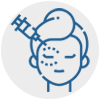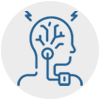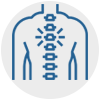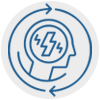Explore this page:

Motor Vehicle Accident
Every year, many Canadians become injured in car accidents. According to statistics published by the Canadian Transportation Safety Board, there are around 150,000 motor vehicle accidents in Canada every year.
Sometimes, even minor motor vehicle accidents can cause injuries that may not be immediately obvious, but that can result in significant discomfort and pain later on. This is because before impact, your body inside the vehicle moves at the speed of the vehicle. During the impact of a car accident, the vehicle stops abruptly, but your body continues to move at that speed until it is stopped, causing stress and injury to bones and soft tissues. Whether the accident was head-on, rear-end or side-impact, the rapid impact and changes in acceleration-deceleration can have major health consequences for the car accident victims.
At HMC Centre, our multidisciplinary team of experts is committed to providing our patients the best care for motor vehicle accident injury rehabilitation. Whether you are suffering from whiplash, post-concussion syndrome, muscle sprains or back pain, we provide non-narcotic management treatment solutions to helping you get back to life and things that matter the most for you.
What are the common types of motor vehicle injury?
Motor accident vehicle injuries vary depending on the type and force of impact sustained on the body.
Some of the most common motor vehicle injuries include the following:
Whiplash
Whiplash is one of the most common types of motor vehicle accident injuries. This type of injury is not limited to high-speed accidents, as whiplash can be also caused by low-speed collisions. Whiplash is a neck injury caused by sudden and forceful movement of the head forward, backwards or sideways. This type of motion can result in significant damage to the neck by causing fractures in the bones of the spine, as well as in the disks between the bones. Moreover, whiplash injury can cause damage to the ligaments, nerves, muscles, and other tissues in the neck.
The length of time it takes to recover from whiplash injury can be difficult to predict. Moreover, whiplash can cause the following lasting effects:
- Chronic Neck Pain
- Chronic Headaches
Concussions
A concussion is a type of mild traumatic brain injury often sustained during car accidents, and is typically caused by a bump, blow or jolt to the head. It is also possible to get a concussion from a whiplash-type injury that causes the brain to quickly shake inside the head sustained during a motor vehicle collision. Although most people recover from the concussion completely, some individuals who sustained a concussion injury continue to experience long-term symptoms, called post-concussion syndrome.
Some of the common symptoms of the post-concussion syndrome include the following:
Post-concussion syndrome can have significant negative consequences on the overall quality of life. Many individuals who suffer from it experience concussion-like symptoms at rest or when performing physical or mental activities, such as exercise or work. These effects could be detrimental to physical, professional, and social aspects of their lives.
The long-term effects of a concussion include the following:
- Persistent headaches
- Difficulty concentrating
- Irritability and personality/behaviour changes
- Memory problems
- Sleep problems
- Depression and psychological problems
- Disorders affecting smell and taste
- Sensitivity to light and sounds
Post-Traumatic Headaches
Headaches are some of the most common and debilitating health consequences of motor vehicle accidents. Typically, this type of headache arises following head and/or brain injury and can persist for months or even years after the accident. Post-traumatic headache refers to headache which develops within seven days of the injury, often resembling migraine and tension-type headache. According to studies, it often resolves within three months of injury; however, in some people, post-traumatic headache can persist for significantly longer.
Low back pain
Back pain is a common symptom after sustaining a motor vehicle accident, and often involves low back pain.
Often, low back pain following a car accident arises due to whiplash effect upon impact and is often associated with the following underlying injuries:
- Herniated discs
- Sprains
- Soft tissue damage of muscles or joints
- Pinched nerves
Compressive forces produced by the collision impact can cause tearing and herniation of spinal discs, leading to nerve compression and pain. Low back pain accompanied by tingling and numbness sensations often indicates herniated discs or pinched nerves in the lower back. Moreover, lower back muscle sprains and strains are also common as a result of car accident injury.
What are the treatments for motor vehicle accident injuries?
There are several types of treatments for car accident injuries and their persistent symptoms, depending on the type of injury and severity of the symptoms.
Here are some of them:
Medication
Some types of pain and inflammation arising from car accident injuries can be effectively treated with over-the-counter or prescription medication. Moreover, medication can be used to alleviate headaches and migraines which can be common following head injuries sustained during collision impact.
Acupuncture
Acupuncture is an ancient medical practice based on traditional Chinese medicine widely used around the world to treat a variety of medical conditions. Acupuncture can be used alone or in conjunction with other therapies, including more conventional methods. Numerous scientific research studies have demonstrated that acupuncture can help to alleviate pain, including chronic low-back pain and neck pain due to whiplash injury. In addition, studies have also shown that acupuncture can be used to treat recurring headaches and migraines which often arise following concussions and head injuries sustained during motor vehicle accidents.
Nerve Block
A nerve block injection is a minimally invasive medical procedure which combines the use of anti-inflammatory medications with local anesthetics to prevent or manage different types of pain. When injected near a nerve, the nerve block prevents the release of chemicals that send pain signals to the brain. This procedure can be used in motor vehicle rehabilitation to alleviate low back pain and neck pain, as well as chronic headaches and migraines.
Botox® Treatment
Botox treatment can be used to effectively reduce the frequency of recurrent headaches and migraines following head injury sustained during a car accident. This procedure involves injections of one of the forms of botulinum toxin, which is a protein produced by the bacterium Clostridium botulinum and species related to it. In turn, this toxin blocks signal transmission from nerves to muscles, resulting in muscle relaxation, while reducing pain and frequency of chronic headaches and migraines.
Manual connective/soft tissue manipulation
Osteopathic manual treatment (OMT) is a safe and effective way to reduce chronic pain following a motor vehicle accident. This type of therapy involves the use of a variety of manipulative and gentle techniques to restore the biomechanical equilibrium of muscles and joints. OMT can be effectively used to treat back and neck pain following traumatic injury, restoring movement and function, while reducing muscle spasms, pain and discomfort.







